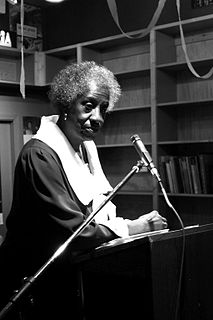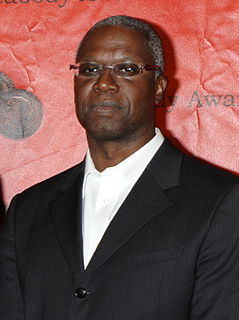A Quote by Angela Davis
I do think it's extremely important to acknowledge the gains that were made by the civil rights movement, the black power movement.Institutional transformations happened directly as a result of the movements that people, unnamed people, organized and gave their lives to.
Related Quotes
The civil rights movement didn't deal with the issue of political disenfranchisement in the Northern cities. It didn't deal with the issues that were happening in places like Detroit, where there was a deep process of deindustrialization going on. So you have this response of angry young people, with a war going on in Vietnam, a poverty program that was insufficient, and police brutality. All these things gave rise to the black power movement. The black power movement was not a separation from the civil rights movement, but a continuation of this whole process of democratization.
The great social justice changes in our country have happened when people came together, organized, and took direct action. It is this right that sustains and nurtures our democracy today. The civil rights movement, the labor movement, the women's movement, and the equality movement for our LGBT brothers and sisters are all manifestations of these rights.
In less than a century we experienced great movement. The youth movement! The labor movement! The civil rights movement! The peace movement! The solidarity movement! The women's movement! The disability movement! The disarmament movement! The gay rights movement! The environmental movement! Movement! Transformation! Is there any reason to believe we are done?
The gay rights movement of recent years has been an inspiring victory for humanity and it is in the tradition of the civil rights movement when I was a young boy in the South, the women's suffrage movement when my mother was a young woman in Tennessee, the abolition movement much farther back, and the anti-apartheid movement when I was in the House of Representatives. All of these movements have one thing in common: the opposition to progress was rooted in an outdated understanding of morality.
You have to join every other movement for the freedom of people. Therefore join the movement as individuals against anti-Semitism, join the movements for the rights of Hispanics, the rights of women, the rights of gays. In other words, I think that each movement has to stand on its own feet because it has a particular agenda, but it can ask other people.
Generally, the arguments for same-sex marriage go along these lines: 'I have a civil right.' What the homosexual movement wants to do is to hitch their agenda to the civil rights movement, but I point out that this is illegitimate for a number of reasons. Number one, no black person has ever left his black-ness or changed his black-ness, but plenty of people have come out of the homosexual movement. What we need to do is distinguish between race and behavior.
Movements are not radical. Movements are the American way. A small group of abolitionists writing and speaking eventually led to the end of slavery. A few stirred-up women brought about women's voting. The Populist movement, the Progressive movement, the anti-Vietnam War movement, the women's movement - the examples go on and on of 'little people' getting together and telling the truth about their lives. They made our government act.
In the South, prior to the Civil Rights movement and the 1964 Civil Rights Act, democracy was the rule. The majority of people were white, and the white majority had little or no respect for any rights which the black minority had relative to property, or even to their own lives. The majority - the mob and occasionally the lynch mob - ruled.
You can't separate the phenomenal birth of unionism in the United States of America from the Pullman porters. This same small group of men, who grew to be 10,000 strong, was also the organizational foundation for the civil rights movement and all of the gains that were made in the '40s and the '50s. That, and the black church.
I think one of the tragedies of the civil rights movement was because the civil rights movement became so court-focused, I think that there was a tendency to lose track of the political and community organizing, and activities on the ground, that are able to put together the actual coalitions of power throughout which you bring about redistributive change. And in some ways, we still suffer from that.




































